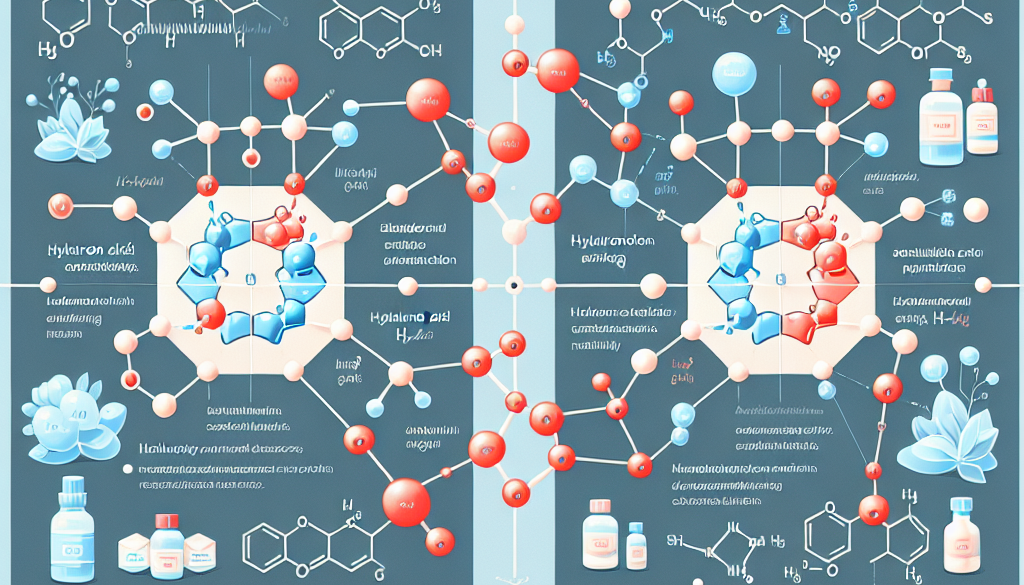Is Hyaluronic Acid and Sodium Hyaluronate the Same?
-
Table of Contents
- Hyaluronic Acid vs. Sodium Hyaluronate: Understanding the Differences
- What is Hyaluronic Acid?
- What is Sodium Hyaluronate?
- Key Differences Between Hyaluronic Acid and Sodium Hyaluronate
- Benefits in Skincare
- Applications in Cosmetics and Dermatology
- Choosing Between Hyaluronic Acid and Sodium Hyaluronate
- Conclusion
- Explore ETprotein’s Protein Products
Hyaluronic Acid vs. Sodium Hyaluronate: Understanding the Differences
In the world of skincare and cosmetics, ingredients like hyaluronic acid and sodium hyaluronate often appear prominently on product labels, touted for their hydrating and anti-aging properties. Despite their similar functions and names, these two substances are not exactly the same. This article delves into the distinctions between hyaluronic acid and sodium hyaluronate, exploring their unique properties, uses, and benefits in skincare.
What is Hyaluronic Acid?
Hyaluronic acid (HA) is a naturally occurring polysaccharide found in the human body, primarily within the skin, connective tissues, and eyes. Its main function is to retain water to keep tissues well lubricated and moist. HA is renowned for its incredible ability to hold up to 1000 times its weight in water, making it a vital component in maintaining skin hydration and volume.
What is Sodium Hyaluronate?
Sodium hyaluronate is a salt derived from hyaluronic acid. It shares the same fundamental chemical structure as HA but has a lower molecular weight, which allows it to penetrate the skin more easily when used in skincare formulations. This characteristic makes sodium hyaluronate an effective ingredient for delivering deep hydration to the skin layers.
Key Differences Between Hyaluronic Acid and Sodium Hyaluronate
- Molecular Weight: Hyaluronic acid typically has a higher molecular weight compared to sodium hyaluronate. This difference affects how each compound interacts with the skin. HA tends to stay on the skin’s surface, providing moisture and helping to form a barrier against environmental factors. In contrast, sodium hyaluronate can penetrate deeper into the skin due to its smaller size.
- Hydration and Penetration: While both compounds are excellent for hydration, sodium hyaluronate’s lower molecular weight allows it to hydrate the skin at a deeper level. Hyaluronic acid, however, is better suited for forming a protective layer on the skin’s surface.
- Stability and Longevity: Sodium hyaluronate is generally more stable and less susceptible to oxidation than hyaluronic acid. This stability makes it a preferred choice in many skincare formulations.
Benefits in Skincare
Both hyaluronic acid and sodium hyaluronate are celebrated for their benefits in skincare, which include:
- Moisturizing: They attract and retain moisture in the skin, which helps to prevent dryness and keeps the skin hydrated and plump.
- Anti-Aging: By helping to maintain skin hydration, they can reduce the appearance of fine lines and wrinkles.
- Healing Properties: They are involved in tissue repair and can help to soothe skin conditions such as wounds, burns, and ulcers.
- Suitable for All Skin Types: Both ingredients are gentle on the skin and suitable for all skin types, including sensitive skin.
Applications in Cosmetics and Dermatology
Hyaluronic acid and sodium hyaluronate are used extensively in the cosmetic industry, not only in topical skincare products like serums, creams, and masks but also in dermal fillers for aesthetic procedures. Their ability to help restore skin volume and smooth out skin makes them popular choices for anti-aging treatments.
Choosing Between Hyaluronic Acid and Sodium Hyaluronate
When deciding between hyaluronic acid and sodium hyaluronate, consider your skincare goals and skin type. If you are looking for surface hydration and a protective barrier, hyaluronic acid might be the better option. For deeper hydration and anti-aging properties, sodium hyaluronate could be more effective.
Conclusion
While hyaluronic acid and sodium hyaluronate are closely related and used interchangeably in the skincare industry, they have distinct differences that affect how they perform in skincare formulations. Understanding these differences can help consumers make informed choices about the products they use to achieve their desired skincare results.
Explore ETprotein’s Protein Products
If you’re interested in enhancing your health and wellness routine, consider exploring ETprotein’s range of high-quality protein products. From organic rice protein to unique options like watermelon seed protein, ETprotein offers a variety of supplements that cater to diverse dietary needs and preferences. These products are ideal for anyone looking to support their nutritional goals with clean, effective supplements.
ETprotein is Sodium hyaluronate Factory Manufacturer and Supplier in China, Check further information by visiting the Sodium hyaluronate Product Page
Sodium hyaluronate Product Page
Request Quotation and Samples of Sodium hyaluronate from ETprotein
About ETprotein
ETprotein, a reputable protein and elite nutrition ingredients Sodium hyaluronate Chinese factory manufacturer and supplier, is renowned for producing, stocking, exporting, and delivering the highest quality organic bulk vegan proteins and elite nutritional ingredients Sodium hyaluronate. They include Organic rice protein, clear rice protein, pea protein, clear pea protein, watermelon seed protein, pumpkin seed protein, sunflower seed protein, mung bean protein, peanut protein. Their offerings, characterized by a neutral taste, non-GMO, allergen-free attributes, cater to a diverse range of industries. They serve nutraceutical, pharmaceutical, cosmeceutical, veterinary, as well as food and beverage finished product distributors, traders, and manufacturers across Europe, USA, Canada, Australia, Thailand, Japan, Korea, Brazil, and Chile, among others.
ETprotein specialization includes exporting and delivering tailor-made protein powder and finished nutritional supplements. Their extensive product range covers sectors like Food and Beverage, Sports Nutrition, Weight Management, Dietary Supplements, Health and Wellness Products, and Infant Formula, ensuring comprehensive solutions to meet all your protein needs.
As a trusted company by leading global food and beverage brands and Fortune 500 companies, ETprotein reinforces China’s reputation in the global arena. For more information or to sample their products, please contact them and email sales(at)ETprotein.com today.














